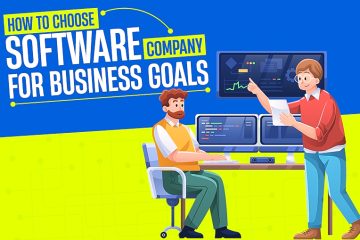Introduction
The e-commerce industry has grown exponentially in the last decade, with businesses of all sizes vying for a competitive edge. To thrive in this dynamic landscape, e-commerce businesses need robust and feature-rich software that streamlines operations, enhances user experiences, and drives sales. Partnering with an IT software company in Delhi provides access to cutting-edge solutions tailored to meet the specific needs of e-commerce businesses. With expertise in software development services in Delhi, these companies create powerful platforms that support scalability, security, and efficiency.
This article explores the top software features every e-commerce business must have to stay ahead in 2025.
Key Software Features for E-commerce Businesses
1. User-Friendly Interface (UI/UX)
A seamless user experience is critical for retaining customers and encouraging repeat purchases.
- Intuitive Navigation: Easy-to-use menus, filters, and search functionalities.
- Responsive Design: Ensures the website or app works flawlessly on desktops, tablets, and mobile devices.
- Personalization: AI-powered recommendations based on user behavior and preferences.
By providing a smooth shopping experience, businesses can reduce cart abandonment and increase conversions.
2. Secure Payment Gateway Integration
Trust and security are paramount in e-commerce. Robust payment gateway integration ensures secure and seamless transactions.
- Multiple Payment Options: Credit/debit cards, UPI, e-wallets, and COD (cash on delivery).
- SSL Encryption: Protects sensitive customer data during transactions.
- Fraud Detection: Tools to detect and prevent fraudulent activities.
An IT software company in Delhi can customize payment solutions to meet local and global compliance standards.
3. Inventory Management System
Efficient inventory management is vital to avoid stockouts or overstocking. Key features include:
- Real-Time Stock Updates: Monitor inventory levels across multiple warehouses and sales channels.
- Automated Reordering: Alerts when stock levels reach a critical threshold.
- Product Categorization: Organize products by categories, attributes, and tags for easy management.
Custom software development services in Delhi can integrate these features to enhance supply chain efficiency.
4. Customer Relationship Management (CRM)
Maintaining strong relationships with customers is essential for long-term success. CRM tools help businesses:
- Track Customer Interactions: Understand buying patterns and preferences.
- Automate Marketing Campaigns: Send personalized emails, SMS, and push notifications.
- Loyalty Programs: Reward repeat customers with discounts, points, or exclusive deals.
CRM integration ensures better customer engagement and higher retention rates.
5. Search Engine Optimization (SEO) Tools
To attract organic traffic, e-commerce platforms must be optimized for search engines.
- Customizable Metadata: Titles, descriptions, and keywords for product pages.
- URL Structuring: SEO-friendly URLs to improve ranking.
- Image Optimization: Compress images without compromising quality for faster loading speeds.
- Site Speed Optimization: Reduces page load times, enhancing user experience.
Partnering with a skilled IT software company in Delhi ensures that your platform is optimized for maximum visibility online.
6. Advanced Analytics and Reporting
Data-driven decisions are crucial for scaling e-commerce businesses. Analytics tools provide insights into:
- Sales Trends: Identify best-selling products and seasonal demands.
- Customer Behavior: Track user activity, such as clicks, views, and purchases.
- Marketing ROI: Measure the effectiveness of campaigns and channels.
- Inventory Performance: Analyze stock turnover rates and identify slow-moving items.
7. Multi-Language and Multi-Currency Support
To cater to a global audience, e-commerce platforms must offer multi-language and multi-currency support.
- Language Localization: Translate content into local languages.
- Currency Conversion: Display prices in customers’ preferred currencies.
- Tax and Compliance Integration: Automate tax calculations based on regions.
8. Mobile-Friendly Platform
With mobile commerce growing rapidly, having a mobile-friendly platform is non-negotiable.
- Mobile-Optimized Websites: Ensure fast loading speeds and easy navigation on mobile devices.
- Dedicated Mobile Apps: Offer a more personalized and seamless shopping experience.
- Push Notifications: Notify users about new arrivals, discounts, and abandoned carts.
9. Robust Security Features
Data breaches can tarnish an e-commerce business’s reputation. Security features should include:
- Two-Factor Authentication (2FA): Adds an extra layer of protection during login.
- Data Encryption: Safeguards sensitive information like payment details and passwords.
- Regular Security Audits: Identifies and fixes vulnerabilities.
10. Scalable Architecture
As businesses grow, their e-commerce platform must accommodate increasing traffic and transactions. Scalable software ensures:
- High Performance During Peak Times: Handle sales surges without downtime.
- Easy Integration of New Features: Add tools like chatbots, analytics, or payment options as needed.
Why Partner with an IT Software Company in Delhi?
1. Expertise in E-commerce Development
Delhi-based software companies specialize in creating customized e-commerce platforms that align with specific business needs.
2. Cost-Effective Solutions
Compared to global markets, software development services in Delhi are more affordable without compromising quality.
3. Ongoing Support and Maintenance
Delhi-based companies provide continuous support to ensure your platform remains up-to-date and secure.
4. Local Market Understanding
An IT software company in Delhi understands the nuances of the Indian market, helping businesses cater to local audiences effectively.
Future Trends in E-commerce Software
- AI-Powered Recommendations
AI will drive smarter product recommendations based on user behavior and preferences. - Voice Commerce
Voice search and shopping will become more prevalent, requiring platforms to adapt. - Augmented Reality (AR)
AR will allow customers to visualize products in real-world settings before purchase. - Subscription Models
E-commerce businesses will adopt subscription-based services to increase customer retention. - Blockchain for Transactions
Blockchain will enhance transparency and security in payment processing.
Conclusion
For e-commerce businesses, having the right software features is critical to staying competitive in 2025. From inventory management and payment gateways to mobile optimization and security, a robust platform ensures efficiency, scalability, and superior customer experiences.
By partnering with an IT software company in Delhi, businesses can leverage cutting-edge software development services in Delhi to build customized e-commerce platforms tailored to their needs. Investing in the right features and technology not only drives growth but also ensures long-term success in a rapidly evolving digital landscape.



0 Comments